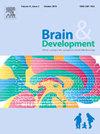Parenting stress in autism spectrum disorder: A comparative analysis with other developmental disabilities
IF 1.3
4区 医学
Q4 CLINICAL NEUROLOGY
引用次数: 0
Abstract
Objective
To compare parenting stress between parents of children with autism spectrum disorder (ASD) and other developmental disabilities (DDs) and to examine ASD's influence on parenting stress through mediation analysis.
Methods
We retrospectively analyzed 48 children with ASD (ASD group) and 77 with non-ASD DDs (non-ASD group), along with one of their parents, at the Gyeongsang National University Hospital between May 2021 and August 2024. All underwent developmental assessments and completed the Korean version of the Parenting Stress Index-4 and the Child Interactive Behavior Test (CIBT).
Results
The ASD group's median age was 37.5 months, with 37 boys (77.1 %). No significant difference was found in child age, sex, or parental demographics between the groups. Total parenting stress was significantly higher in the ASD group (p = 0.01), primarily due to higher child domain scores (p<0.01) than in the non-ASD group. Among the child domain subscales, Distractibility/Hyperactivity, Adaptability, Reinforces Parent, and Acceptability were significantly higher in the ASD group, while only the Attachment subscale differed in the parent domain. For high parenting stress (>85th percentile), Initiative Interaction—a CIBT subscale—was the only independent predictor, rather than ASD diagnosis. Mediation analysis showed no direct effect of ASD on parenting stress (β = 4.28, p = 0.42) but an indirect effect via reduced initial interaction (β = 3.68, p<0.05).
Conclusions
Parenting stress was higher in the ASD group, mainly due to child-related factors. ASD influenced parenting stress indirectly through reduced initiative interaction. These findings provide further insight into parenting stress in families of children with ASD.
自闭症谱系障碍的父母压力:与其他发育障碍的比较分析
目的比较自闭症谱系障碍(ASD)和其他发育障碍(dd)患儿父母的育儿压力,并通过中介分析探讨ASD对育儿压力的影响。方法回顾性分析2021年5月至2024年8月在庆尚国立大学医院收治的48例ASD患儿(ASD组)和77例非ASD患儿(非ASD组)及其父母。所有人都接受了发展评估,并完成了韩国版的养育压力指数-4和儿童互动行为测试(CIBT)。结果ASD组中位年龄为37.5个月,男孩37例(77.1%)。两组之间在儿童年龄、性别或父母人口统计数据方面没有发现显著差异。ASD组的总育儿压力显著高于非ASD组(p = 0.01),主要是由于儿童领域得分高于非ASD组(p = 0.01)。在儿童领域的子量表中,注意力分散/多动、适应性、强化父母和可接受性显著高于ASD组,而只有依恋子量表在父母领域存在差异。对于高养育压力(第85百分位),主动互动(CIBT子量表)是唯一的独立预测因子,而不是ASD诊断。中介分析显示,ASD对养育压力无直接影响(β = 4.28, p = 0.42),但通过减少初始互动产生间接影响(β = 3.68, p<0.05)。结论ASD组家长压力较高,主要与儿童相关因素有关。ASD通过减少主动互动间接影响养育压力。这些发现为自闭症儿童家庭的养育压力提供了进一步的见解。
本文章由计算机程序翻译,如有差异,请以英文原文为准。
求助全文
约1分钟内获得全文
求助全文
来源期刊

Brain & Development
医学-临床神经学
CiteScore
3.60
自引率
0.00%
发文量
153
审稿时长
50 days
期刊介绍:
Brain and Development (ISSN 0387-7604) is the Official Journal of the Japanese Society of Child Neurology, and is aimed to promote clinical child neurology and developmental neuroscience.
The journal is devoted to publishing Review Articles, Full Length Original Papers, Case Reports and Letters to the Editor in the field of Child Neurology and related sciences. Proceedings of meetings, and professional announcements will be published at the Editor''s discretion. Letters concerning articles published in Brain and Development and other relevant issues are also welcome.
 求助内容:
求助内容: 应助结果提醒方式:
应助结果提醒方式:


